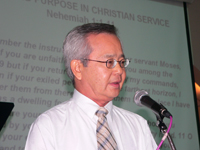
rain water wind blows,
plants fruit,
in the garden of the minds,
single water droplet falls,
pond calm surface calls,
in mind like living waters,
ripple widens,
outward forever flows.
Nicholas Yeo has been pastoring Holy Light Church (English) for 36 years. He was appointed as preacher in the Presbyterian church in 1973 and ordained in 1979. He retired on 1st October 2009.
author’s notes:
“rain” falls on all persons. The bible states that God allows rain to fall on the “just” and the “unjust.” This also shows the extend of Nicholas’ ministry which extends to Christians and non-Christians alike.
“water” signifies life. It is a life-giving work that Nicholas has been involved with all these years. Thirty six years is a long time. It reflects the character of a person and the strength of his calling.
“wind blows” – the Greek for Spirit is pneuma which is often translated as breath or wind. This indicates the influence of the Holy Spirit in Nicholas’ ministry. As at times, the direction in which the wind blows is unpredictable, as does the direction the Holy Spirit has led Nicholas’ ministry.
“plants fruit” shows the importance of investing in human beings. Plants are used to represent people in Nicholas’ ministry while fruit may be self-development of these people to fulfil their personal destinies. It also indicates the fruit of the Holy Spirit of their lives.
“in the garden of the minds” is where the battleground is. His teaching and caring ministry may be likened to a gardener caring for a garden. The planting, tilling, watering, prunings are conducive to growth as in the light from the Son.
“single water droplet falls, pond calm surface calls” is the imagery of a drop of water falling on the placid calm surface of a pond or a lake. A ripple forms and widens in concentric circles outwards. His ministry is like a drop of water in God’s redemptive plan.
“in mind like living waters, ripple widens, outward forever flows.” No one but God will know the effect of each individual action or act of kindness. Like as ripple in the lake spreading ever outwards, causing secondary ripples and so on, Nicholas’ ministry has far reaching circumstances that no one will know.
I dedicate this to the man and his wife who serve their God well.

























 Catalyst Leadership
Catalyst Leadership







